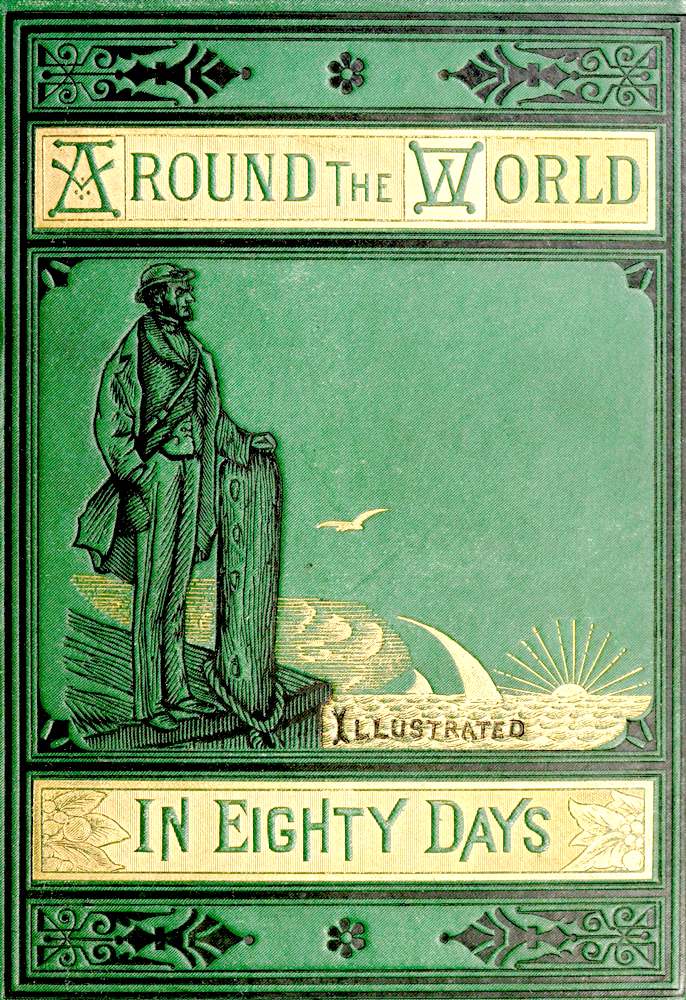|
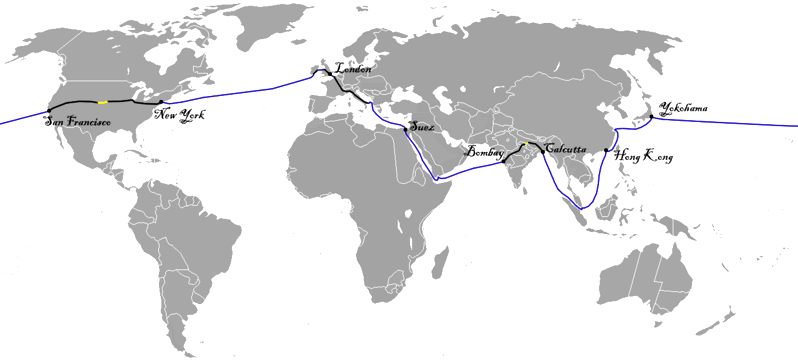
Map
of the route taken by Phileas Fogg, starting in London, then proceeding
east to Suez, Bombay, Calcutta, Hong Kong , Yokohama, San Francisco, New
York, and across the Atlantic
ocean to Ireland, then Liverpool England, and back to London. The route
planner below is for a circumnavigation on water in under 80 days, using
hydrogen, as per the author's prediction in The Mysterious Island. It
would be a major achievement if this was arranged to honor the 150th
anniversary of his publication.
<<<<
CHAPTER XXVII.
IN WHICH PASSEPARTOUT UNDERGOES, AT A SPEED OF TWENTY MILES AN HOUR, A COURSE OF MORMON HISTORY
During the night of the 5th of December, the train ran south-easterly for about fifty miles; then rose an equal distance in a north-easterly direction, towards the Great Salt Lake.
Passepartout, about nine o’clock, went out upon the platform to take the air. The weather was cold, the heavens grey, but it was not snowing. The sun’s disc, enlarged by the mist, seemed an enormous ring of gold, and Passepartout was amusing himself by calculating its value in pounds sterling, when he was diverted from this interesting study by a strange-looking personage who made his appearance on the platform.
This personage, who had taken the train at Elko, was tall and dark, with black moustache, black stockings, a black silk hat, a black waistcoat, black trousers, a white cravat, and dogskin gloves. He might have been taken for a clergyman. He went from one end of the train to the other, and affixed to the door of each car a notice written in manuscript.
Passepartout approached and read one of these notices, which stated that Elder William Hitch, Mormon missionary, taking advantage of his presence on train No. 48, would deliver a lecture on Mormonism in car No. 117, from eleven to twelve o’clock; and that he invited all who were desirous of being instructed concerning the mysteries of the religion of the “Latter Day Saints” to attend.
“I’ll go,” said Passepartout to himself. He knew nothing of Mormonism except the custom of polygamy, which is its foundation.
The news quickly spread through the train, which contained about one hundred passengers, thirty of whom, at most, attracted by the notice, ensconced themselves in car No. 117. Passepartout took one of the front seats. Neither Mr. Fogg nor Fix cared to attend.
At the appointed hour Elder William Hitch rose, and, in an irritated voice, as if he had already been contradicted, said, “I tell you that Joe Smith is a martyr, that his brother Hiram is a martyr, and that the persecutions of the United States Government against the prophets will also make a martyr of Brigham Young. Who dares to say the contrary?”
No one ventured to gainsay the missionary, whose excited tone contrasted curiously with his naturally calm visage. No doubt his anger arose from the hardships to which the Mormons were actually subjected. The government had just succeeded, with some difficulty, in reducing these independent fanatics to its rule. It had made itself master of Utah, and subjected that territory to the laws of the Union, after imprisoning Brigham Young on a charge of rebellion and polygamy. The disciples of the prophet had since redoubled their efforts, and resisted, by words at least, the authority of Congress. Elder Hitch, as is seen, was trying to make proselytes on the very railway trains.
Then, emphasising his words with his loud voice and frequent gestures, he related the history of the Mormons from Biblical times: how that, in Israel, a Mormon prophet of the tribe of Joseph published the annals of the new religion, and bequeathed them to his son Mormon; how, many centuries later, a translation of this precious book, which was written in Egyptian, was made by Joseph Smith, junior, a Vermont farmer, who revealed himself as a mystical prophet in 1825; and how, in short, the celestial messenger appeared to him in an illuminated forest, and gave him the annals of the Lord.
Several of the audience, not being much interested in the missionary’s narrative, here left the car; but Elder Hitch, continuing his lecture, related how Smith, junior, with his father, two brothers, and a few disciples, founded the church of the “Latter Day Saints,” which, adopted not only in America, but in England, Norway and Sweden, and Germany, counts many artisans, as well as men engaged in the liberal professions, among its members; how a colony was established in Ohio, a temple erected there at a cost of two hundred thousand dollars, and a town built at Kirkland; how Smith became an enterprising banker, and received from a simple mummy showman a papyrus scroll written by Abraham and several famous Egyptians.
The Elder’s story became somewhat wearisome, and his audience grew gradually less, until it was reduced to twenty passengers. But this did not disconcert the enthusiast, who proceeded with the story of Joseph Smith’s bankruptcy in 1837, and how his ruined creditors gave him a coat of tar and feathers; his reappearance some years afterwards, more honourable and honoured than ever, at Independence, Missouri, the chief of a flourishing colony of three thousand disciples, and his pursuit thence by outraged Gentiles, and retirement into the Far West.
Ten hearers only were now left, among them honest Passepartout, who was listening with all his ears. Thus he learned that, after long persecutions, Smith reappeared in Illinois, and in 1839 founded a community at Nauvoo, on the Mississippi, numbering twenty-five thousand souls, of which he became mayor, chief justice, and general-in-chief; that he announced himself, in 1843, as a candidate for the Presidency of the United States; and that finally, being drawn into ambuscade at Carthage, he was thrown into prison, and assassinated by a band of men disguised in masks.
Passepartout was now the only person left in the car, and the Elder, looking him full in the face, reminded him that, two years after the assassination of Joseph Smith, the inspired prophet, Brigham Young, his successor, left Nauvoo for the banks of the Great Salt Lake, where, in the midst of that fertile region, directly on the route of the emigrants who crossed Utah on their way to California, the new colony, thanks to the polygamy practised by the Mormons, had flourished beyond expectations.
“And this,” added Elder William Hitch, “this is why the jealousy of Congress has been aroused against us! Why have the soldiers of the Union invaded the soil of Utah? Why has Brigham Young, our chief, been imprisoned, in contempt of all justice? Shall we yield to force? Never! Driven from Vermont, driven from Illinois, driven from Ohio, driven from Missouri, driven from Utah, we shall yet find some independent territory on which to plant our tents. And you, my brother,” continued the Elder, fixing his angry eyes upon his single auditor, “will you not plant yours there, too, under the shadow of our flag?”
“No!” replied Passepartout courageously, in his turn retiring from the car, and leaving the Elder to preach to vacancy.
During the lecture the train had been making good progress, and towards half-past twelve it reached the northwest border of the Great Salt Lake. Thence the passengers could observe the vast extent of this interior sea, which is also called the Dead Sea, and into which flows an American Jordan. It is a picturesque expanse, framed in lofty crags in large strata, encrusted with white salt—a superb sheet of water, which was formerly of larger extent than now, its shores having encroached with the lapse of time, and thus at once reduced its breadth and increased its depth.
The Salt Lake, seventy miles long and thirty-five wide, is situated three miles eight hundred feet above the sea. Quite different from Lake Asphaltite, whose depression is twelve hundred feet below the sea, it contains considerable salt, and one quarter of the weight of its water is solid matter, its specific weight being 1,170, and, after being distilled, 1,000. Fishes are, of course, unable to live in it, and those which descend through the Jordan, the Weber, and other streams soon perish.
The country around the lake was well cultivated, for the Mormons are mostly farmers; while ranches and pens for domesticated animals, fields of wheat, corn, and other cereals, luxuriant prairies, hedges of wild rose, clumps of acacias and milk-wort, would have been seen six months later. Now the ground was covered with a thin powdering of snow.
The train reached Ogden at two o’clock, where it rested for six hours, Mr. Fogg and his party had time to pay a visit to Salt Lake City, connected with Ogden by a branch road; and they spent two hours in this strikingly American town, built on the pattern of other cities of the Union, like a checker-board, “with the sombre sadness of right-angles,” as Victor Hugo expresses it. The founder of the City of the Saints could not escape from the taste for symmetry which distinguishes the Anglo-Saxons. In this strange country, where the people are certainly not up to the level of their institutions, everything is done “squarely”—cities, houses, and follies.
The travellers, then, were promenading, at three o’clock, about the streets of the town built between the banks of the Jordan and the spurs of the Wahsatch Range. They saw few or no churches, but the prophet’s mansion, the court-house, and the arsenal, blue-brick houses with verandas and porches, surrounded by gardens bordered with acacias, palms, and locusts. A clay and pebble wall, built in 1853, surrounded the town; and in the principal street were the market and several hotels adorned with pavilions. The place did not seem thickly populated. The streets were almost deserted, except in the vicinity of the temple, which they only reached after having traversed several quarters surrounded by palisades. There were many women, which was easily accounted for by the “peculiar institution” of the Mormons; but it must not be supposed that all the Mormons are polygamists. They are free to marry or not, as they please; but it is worth noting that it is mainly the female citizens of Utah who are anxious to marry, as, according to the Mormon religion, maiden ladies are not admitted to the possession of its highest joys. These poor creatures seemed to be neither well off nor happy. Some—the more well-to-do, no doubt—wore short, open, black silk dresses, under a hood or modest shawl; others were habited in Indian fashion.
Passepartout could not behold without a certain fright these women, charged, in groups, with conferring happiness on a single Mormon. His common sense pitied, above all, the husband. It seemed to him a terrible thing to have to guide so many wives at once across the vicissitudes of life, and to conduct them, as it were, in a body to the Mormon paradise with the prospect of seeing them in the company of the glorious Smith, who doubtless was the chief ornament of that delightful place, to all eternity. He felt decidedly repelled from such a vocation, and he imagined—perhaps he was mistaken—that the fair ones of Salt Lake City cast rather alarming glances on his person. Happily, his stay there was but brief. At four the party found themselves again at the station, took their places in the train, and the whistle sounded for starting. Just at the moment, however, that the locomotive wheels began to move, cries of “Stop! stop!” were heard.
Trains, like time and tide, stop for no one. The gentleman who uttered the cries was evidently a belated Mormon. He was breathless with running. Happily for him, the station had neither gates nor barriers. He rushed along the track, jumped on the rear platform of the train, and fell, exhausted, into one of the seats.
Passepartout, who had been anxiously watching this amateur gymnast, approached him with lively interest, and learned that he had taken flight after an unpleasant domestic scene.
When the Mormon had recovered his breath, Passepartout ventured to ask him politely how many wives he had; for, from the manner in which he had decamped, it might be thought that he had twenty at least.
“One, sir,” replied the Mormon, raising his arms heavenward —“one, and that was enough!”
NEXT
>>>>
CHAPTERS
1. - I. IN WHICH PHILEAS FOGG AND PASSEPARTOUT ACCEPT EACH OTHER, THE ONE AS
MASTER AND AS MAN
2. - II. IN WHICH PASSEPARTOUT IS CONVINCED THAT HE HAS AT LAST FOUND HIS IDEAL
3. - III. IN WHICH A CONVERSATION TAKES PLACE WHICH SEEMS LIKELY TO COST PHILEAS FOGG DEAR
4. - IV. IN WHICH PHILEAS FOGG ASTOUNDS
PASSEPARTOUT, HIS SERVANT
5. - V. IN WHICH A NEW SPECIES OF FUNDS, UNKNOWN TO THE MONEYED MEN, APPEARS ON ’CHANGE
6. - VI. IN WHICH FIX, THE DETECTIVE, BETRAYS A VERY NATURAL IMPATIENCE
7. - VII. WHICH ONCE MORE DEMONSTRATES THE USELESSNESS OF PASSPORTS AS AIDS TO DETECTIVES
8. - VIII. IN WHICH PASSEPARTOUT TALKS RATHER MORE, PERHAPS, THAN IS PRUDENT
9. - IX. IN WHICH THE RED SEA AND THE INDIAN OCEAN PROVE PROPITIOUS TO THE DESIGNS OF PHILEAS FOGG
10. - X. IN WHICH PASSEPARTOUT IS ONLY TOO GLAD TO GET OFF WITH THE LOSS OF HIS SHOES
11. - XI. IN WHICH PHILEAS FOGG SECURES A CURIOUS MEANS OF CONVEYANCE AT A FABULOUS PRICE
12. - XII. IN WHICH PHILEAS FOGG AND HIS COMPANIONS VENTURE ACROSS THE INDIAN FORESTS, AND WHAT ENSUED
13. - XIII. IN WHICH PASSEPARTOUT RECEIVES A NEW PROOF THAT FORTUNE FAVORS THE BRAVE
14. - XIV. FOGG DESCENDS THE LENGTH OF THE BEAUTIFUL VALLEY OF THE GANGES WITHOUT EVER THINKING OF SEEING IT
15. - XV. IN WHICH THE BAG OF BANKNOTES DISGORGES SOME THOUSANDS OF POUNDS MORE
16. - XVI. IN WHICH FIX DOES NOT SEEM TO UNDERSTAND IN THE LEAST WHAT IS SAID TO HIM
17. - XVII. SHOWING WHAT HAPPENED ON THE VOYAGE FROM SINGAPORE TO HONG KONG
18. - XVIII. IN WHICH PHILEAS FOGG, PASSEPARTOUT, AND FIX GO EACH ABOUT HIS BUSINESS
19. - XIX. IN WHICH PASSEPARTOUT TAKES A TOO GREAT INTEREST IN HIS MASTER, AND WHAT COMES OF IT
20. - XX. IN WHICH FIX COMES FACE TO FACE WITH PHILEAS FOGG
21. - XXI. IN WHICH THE MASTER OF THE “TANKADERE” RUNS GREAT RISK OF LOSING A REWARD OF TWO HUNDRED POUNDS
22. - XXII. PASSEPARTOUT DISCOVERS IT IS CONVENIENT TO HAVE MONEY IN ONE’S POCKET
AT THE ANTIPODES
23. - XXIII. IN WHICH PASSEPARTOUT’S NOSE BECOMES OUTRAGEOUSLY LONG
24. - XXIV. DURING WHICH MR. FOGG AND PARTY CROSS THE PACIFIC OCEAN
25. - XXV. IN WHICH A SLIGHT GLIMPSE IS HAD OF SAN FRANCISCO
26. - XXVI. IN WHICH PHILEAS FOGG AND PARTY TRAVEL BY THE PACIFIC RAILROAD
27. - XXVII. IN WHICH PASSEPARTOUT UNDERGOES, AT A SPEED OF 20 MPH, A COURSE OF MORMON HISTORY
28. - XXVIII. IN WHICH PASSEPARTOUT DOES NOT SUCCEED IN MAKING ANYBODY LISTEN TO REASON
29. - XXIX. IN WHICH CERTAIN INCIDENTS ARE NARRATED WHICH ARE ONLY TO BE MET WITH ON AMERICAN RAILROADS
30. - XXX. IN WHICH PHILEAS FOGG SIMPLY DOES HIS DUTY
31. - XXXI. IN WHICH FIX, THE DETECTIVE, CONSIDERABLY FURTHERS THE INTERESTS OF PHILEAS FOGG
32. - XXXII. IN WHICH PHILEAS FOGG ENGAGES IN A DIRECT STRUGGLE WITH BAD FORTUNE
33. - XXXIII. IN WHICH PHILEAS FOGG SHOWS HIMSELF EQUAL TO THE OCCASION
34. - XXXIV. IN WHICH PHILEAS FOGG AT LAST REACHES LONDON
35. - XXXV. IN WHICH PHILEAS FOGG DOES NOT HAVE TO REPEAT HIS ORDERS TO PASSEPARTOUT TWICE
36. - XXXVI. IN WHICH PHILEAS FOGG’S NAME IS ONCE MORE AT A PREMIUM ON ’CHANGE
37. - XXXVII. PHILEAS FOGG FINDS HE GAINED NOTHING BY HIS TOUR AROUND THE WORLD, UNLESS IT WERE HAPPINESS
PLOT
- AROUND
THE WORLD IN EIGHTY DAYS
The story starts in London on October 2, 1872. Phileas Fogg is a wealthy, solitary, unmarried gentleman with regular habits. The source of his wealth is not known and he lives modestly. He fires his former valet, James Forster, for bringing him shaving
water two degrees too cold. He hires as a replacement
Passepartout, a Frenchman of around 30 years of age.
Later that day in the Reform Club, he gets involved in an argument over an article in
The Daily
Telegraph, stating that with the opening of a new railway section in India, it is now possible to travel around the world in 80 days.
Fogg accepts a wager for £20,000 from his fellow club members, which he will receive if he makes it around the world in 80 days. Accompanied by his manservant
Passepartout, he leaves London by train at 8.45 p.m. on October 2, 1872, and thus is due back at the Reform Club at the same time 80 days later, on December 21.
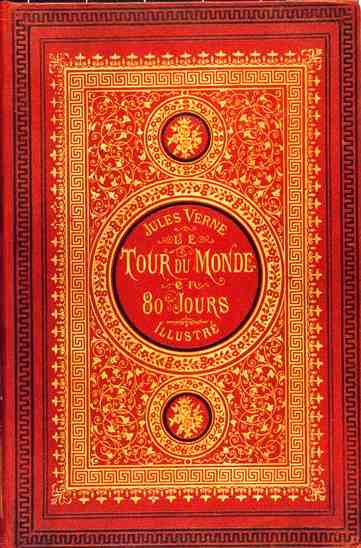
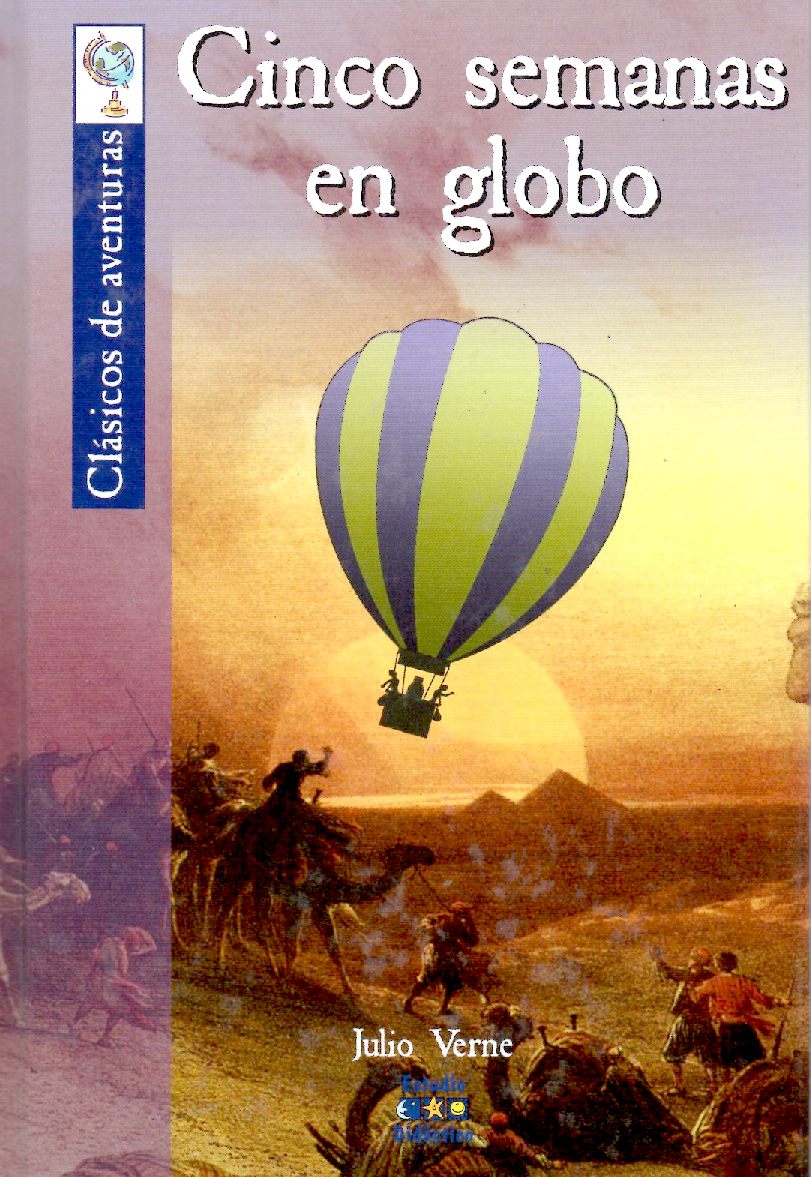
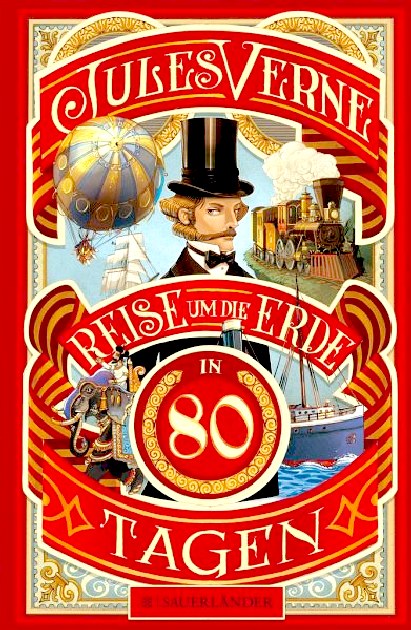
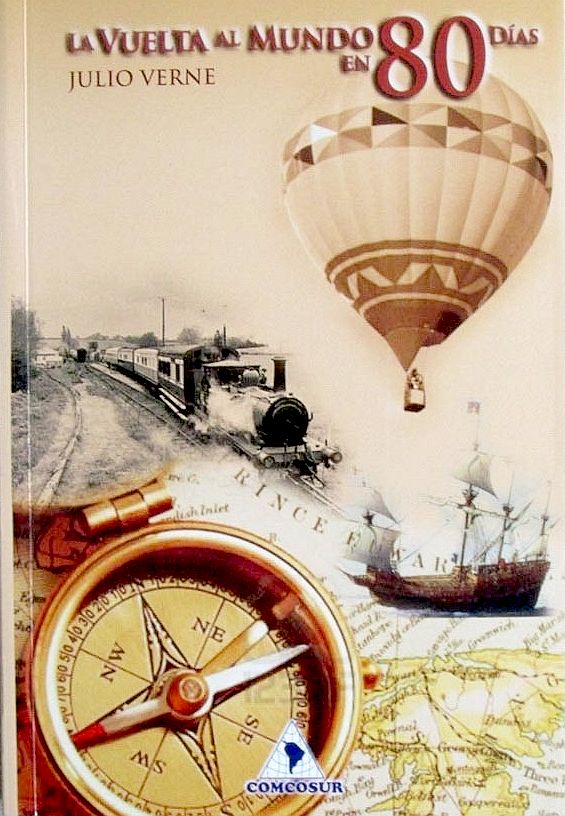
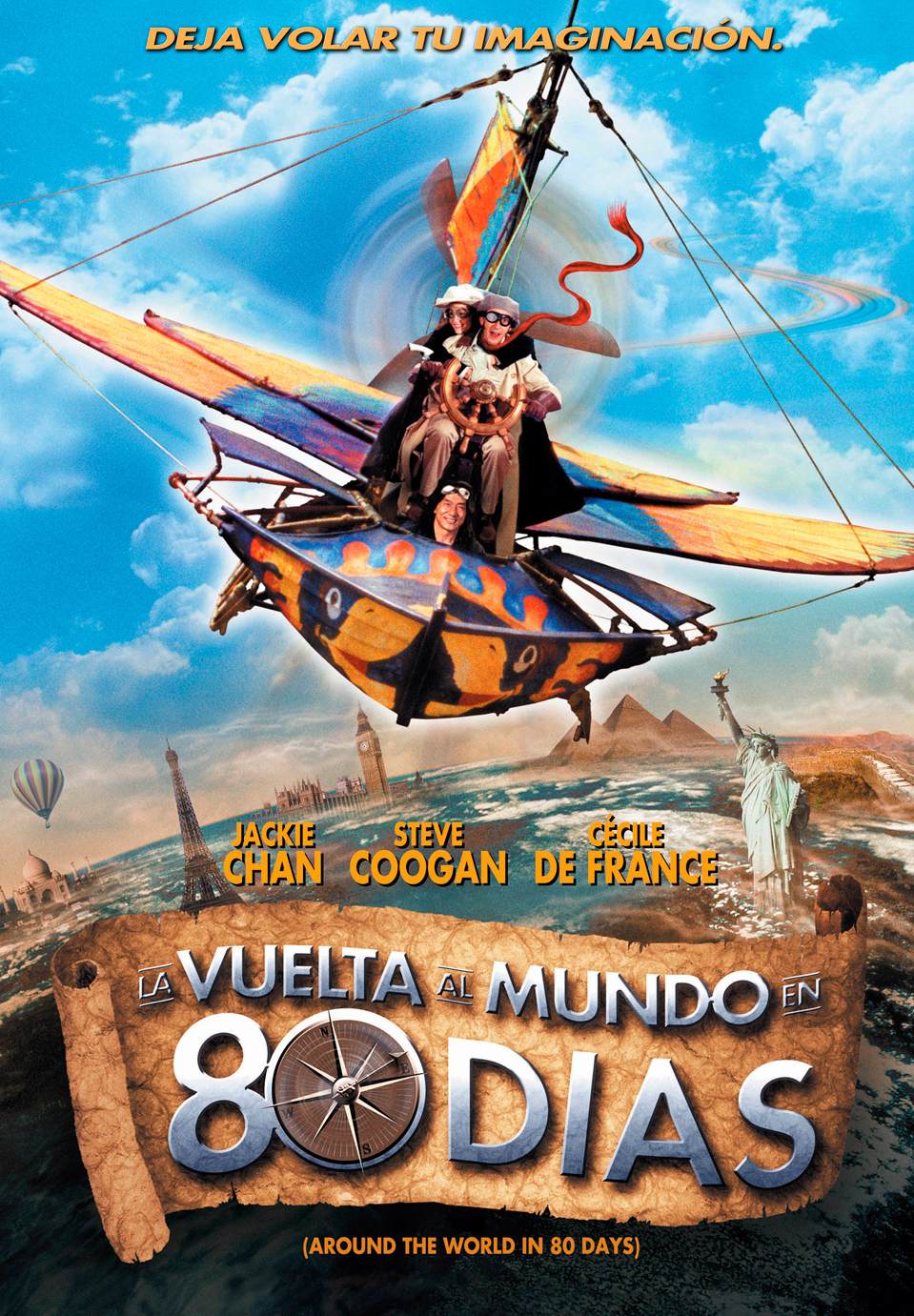
Many
of his stories today seem a little tame, as technology has caught up
with the imagination of the extraordinary French author, and Hollywood
has discovered Computer Generated Images (CGI) allowing super heroes to
grace our screens as never before. Computers are one thing that Verne
did not imagine or seek to portray.
Beginning in late 1872, the serialized version of Verne's famed Around the World in Eighty Days (Le Tour du monde en quatre-vingts jours) first appeared in print. The story of Phileas Fogg and Jean Passepartout takes readers on an adventurous global tour at a time when travel was becoming easier and alluring. In the century plus since its original debut, the work has been adapted for the theater, radio, television and film, including the classic 1956 version starring David
Niven. The TV series starring Pierce Brosnan released in 1989, runs for around 6 hours on
2 DVDs. A BBC
TV travel documentary starring Michael Palin, was also screened in
1989. A second TV series starring David Tennant was produced by the
BBC for 2021.
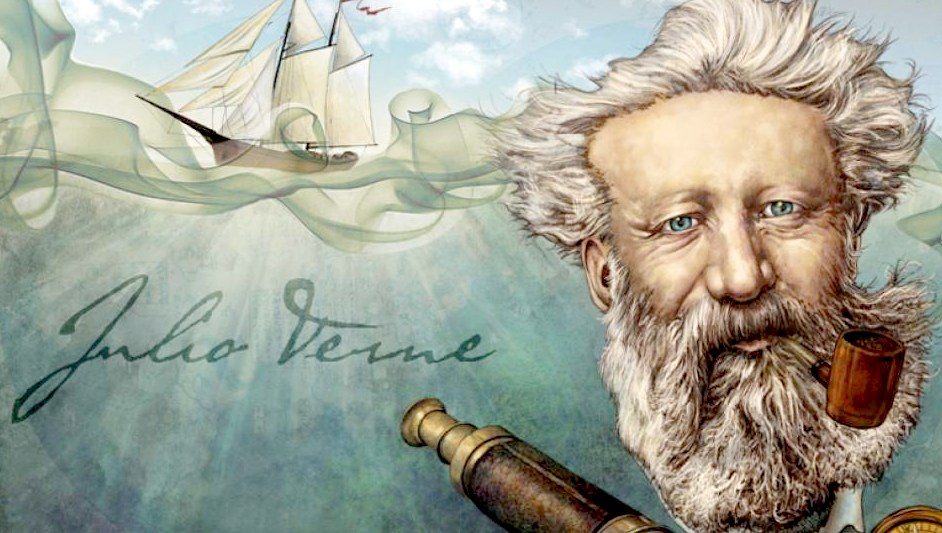
Jules
Verne is known as the Father of Science Fiction
Where
Jules Verne's suggested that it might be possible to travel
Around The
World In 80 Days, we would like to extend that ethos to include
traveling in a Zero
Emission yacht (ZEWT or ZEV) driven by electric
hydro-jets? With the advent of solar power, liquid hydrogen, methanol
reformers, and fuel
cells - we'll wager that it is a distinct possibility - on a scale of the
stake that the legendary Philleas Fogg entered into at the Reform Club in
1872. Now there's a challenge for you. Place your bets!
|







